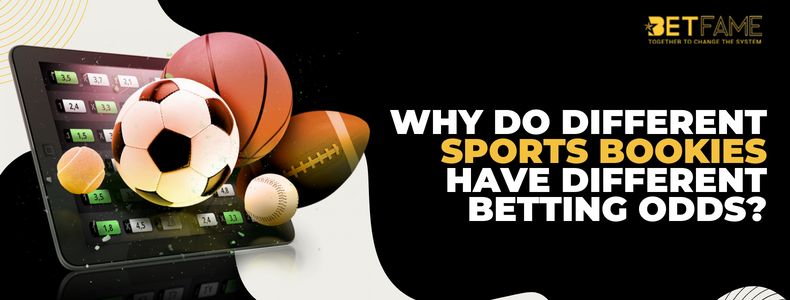
Why Sports Bookies Have Different Betting Odds?
Sports betting usually comes with a wide range of odds. It is not uncommon for different sports bookies to offer completely different betting odds for the exact match and wager. Usually, there will be little difference between the odds between different bookmakers; there are only a few instances where they are the same. Some websites compare these betting odds. Is there a reason for the difference, though? Knowing more about the betting odds will help you understand the differences in odds levels and find the best sportsbooks.
Understanding Betting Odds
Odds in sports betting refer to the probability that a team or competitor will win a game or match. When you look at the team/player with the lowest odds, you can tell who is more likely to succeed. If you place a bet on a team/player with a lower coefficient (sometimes referred to as the "favorite"), you are more likely to win than if you place a bet on a team/player with higher odds. As a result, if you place a successful bet on a team/player with higher odds (sometimes referred to as the "underdog"), you will be paid a higher payout. From this principle, the saying "the higher the risk, the higher the reward" originates.
- Higher Odds = Higher Payouts (The Underdog has a less likely chance of winning)
- Lower Odds = Lower Payouts (The Favourite has a higher chance of winning)
There are three formats for odds - fractional, decimal, or American. In most sports bookies, you can toggle between these three formats because the difference in form does not affect the odds.
How To Calculate Coefficients
A helpful metric when comparing odds is the bookmaker coefficient. Coefficients are straightforward concepts; it is the inverse of the probability or P. The coefficient is, therefore, equal to 1/P.
Real Odds And Implied Odds
The coefficient can be for both natural and implied odds. The coefficient would be without fees or commissions in the first case. A second coefficient represents the odds available from the actual bookmaker.
Coin Flip Odds
A coin flip coefficient can easily use the same example as above. There are two possible outcomes, so each has a 50% chance of occurring. In this case, the coefficient would be 1/P = 1/0.5 = 2. Bookmakers' odds, however, are 9/10. To calculate the coefficient, you must get the odds' P-value. If the odds are 9/10, then the implied probability is 10 out of 9+10 = 19. In this case, the coefficient would be 1/(10/19) = 1.90.
Sports Betting Odds
Let's take sports betting as a more realistic example. Imagine two teams playing soccer against each other. According to experts, the home team has a 60% chance of winning. There is a 30% chance for the away team's win and a 10% chance for a draw. In this case, the coefficient for the home team is 1/0.6 = 1.66, the coefficient for the away team is 1/0.3 = 3.33, and the coefficient for a draw is 1/0.1 = 10.0. After that, you visit two sports betting websites. According to site A, the home team's odds are 1/2, the away team's odds are 5/4, and the draw is 8/1. Site B offers odds of 2/5 for the home team to win, 11/8 for the away team to win, and 6/1 for the draw.
Site A would have P values of 2/(1+2) = 2/3 = 0.66, 4/(5+4) = 4/9 = 0.44, and 1/(8+1) = 1/9 = 0.11. Site B would have P values of 5/(2+5) = 5/7 = 0.71, 8/(11+8) = 8/19 = 0.42, and 1/(6+1) = 1/7 = 0.14. The home, away, and draw coefficients for Site A are 1.51, 2.27, and 9.09, respectively. For Site B, they are 1.41, 2.38, and 7.14.
What Makes Sports Betting Odds Different Between Bookies?
Calculating an event's implied probability takes a lot of time and effort. Each sports betting site has its research team, algorithms, client base, and margins that define what it will ultimately provide. In addition to focusing on edge and overground, sports bookies must also pay attention to public opinion. They must consider these factors in advance and even during an event. Sports bookies compete for your wagers, so they must offer competitive odds while remaining realistic.
Final Thoughts
It's not unusual to find sports betting operators offering odds ranging from the rather generous to the filthy. Identifying different coefficients will be easier if you know what odds mean and how to interpret them. In addition, you now know where those differences originate. When you understand how sports betting odds differ, you will be in a better rank to identify unique profit opportunities.
Tags :- Betting Guide
- Betting Help
- Betting Strategy
- Sports Betting
- Sportsbook
- Profitable Trends
- Soccer Players
- World Cup
- Betting Tips
- Team Reviews
- Player Analysis
- League Reviews
- Club Reviews
- Betting Market
- Manager Reviews
- Match Preview
- Transfers
- Soccer Betting
- Soccer Picks Web Series
- Betting System
- Betting Trends Web Series
- Players Analysis
- League review
- Southamerican soccer
- Betting markets
- Casino Betting








